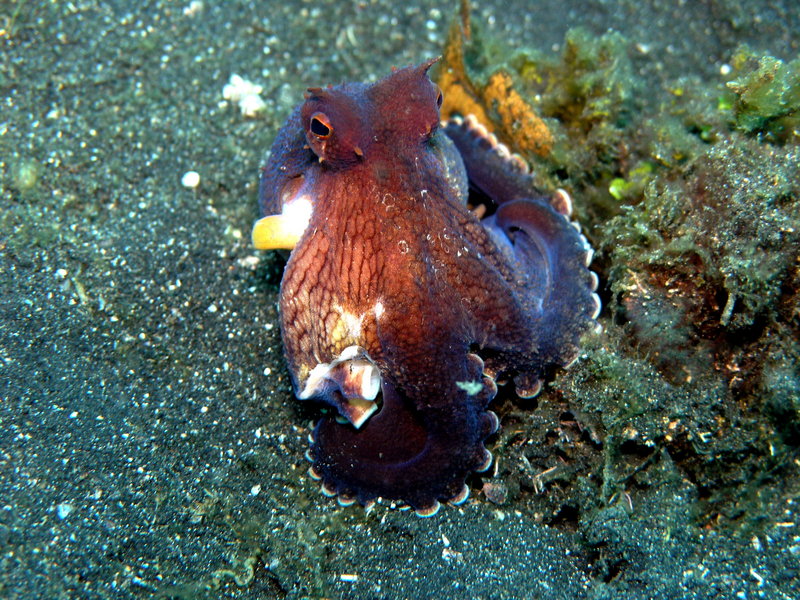ERROR : Server Busy(-1105)
ERROR : Server Busy(-1105)
Coconut Octopus or Veined Octopus (Amphioctopus marginatus) - Wiki
[Photo] Image of a coconut octopus, Octopus marginatus. Taken at Lembeh Straits, North Sulawesi, Indonesia. Date: October 2006. Author: Jens Petersen. Source: http://en.wikipedia.org/wiki/File:Octopus_marginatus2.JPG | Permission is granted to copy, distribute and/or modify this document under the terms of the GNU Free Documentation License, Version 1.2 or any later version published by the Free Software Foundation; with no Invariant Sections, no Front-Cover Texts, and no Back-Cover Texts. A copy of the license is included in the section entitled "GNU Free Documentation License". |
Amphioctopus marginatus
From Wikipedia, the free encyclopedia
Amphioctopus marginatus, also known as the coconut octopus and veined octopus, is a medium-sized cephalopod belonging to the genus Amphioctopus. It is found in tropical waters of the western Pacific Ocean. It commonly preys upon shrimp, crabs, and clams, and displays unusual behaviour, including bipedal walking and gathering and using coconut shells and seashells for shelter.
Size and description
The main body of the octopus is typically around 8 centimeters (3 in) in size, and, with arms, approximately 15 centimeters (6 in) long. The octopus displays a typical color pattern with dark ramified lines similar to veins, usually with a yellow siphon. The arms are usually dark in color, with contrasting white suckers. In many color displays, a lighter trapezoidal area can be seen immediately below the eye.
Behavior and habitat
The coconut octopus is found on sandy bottoms in bays or lagoons. It frequently buries itself in the sand with only its eyes uncovered.
In March 2005, researchers at the University of California, Berkeley, published an article in Science in which A. marginatus was reported to have a bipedal behavior.[1] It is one of only two octopus species known to display such behavior, the other species being Abdopus aculeatus. According to the article, this behavior was discovered in an area off Sulawesi, Indonesia, where the sandy bottom was littered with coconut shells. The bipedal motion appears to mimic a floating coconut.
Researchers from the Melbourne Museum in Australia claimed the creature's use of tools for defense, and the use of available debris to create a defensive fortress. This behavior, observed in Bali and North Sulawesi in Indonesia between 1998 and 2008, was published in the journal Current Biology in December 2009.[3][4][5] The researchers filmed A. marginatus collecting coconut half-shells, discarded by humans, from the sea floor, carrying them up to 20 meters (66 ft), and arranging the shells to form a spherical hiding place akin to a clamshell. The authors claim this behaviour to fall under the definition of tool use because they claim the shells are carried for later use. However, this argument does not hold up to scrutiny in light of the predator environment in which A. marginatus lives. Amphioctopus marginatus lives in soft-sediment areas with many bottom-dwelling predators, such as scorpionfish and flounders, that often bury into the sand and cannot be seen or easily avoided. The coconut shells do not provide constant protection from potential attacks from below while moving along the bottom. Thus, the claim of tool use is not upheld.
http://en.wikipedia.org/wiki/Amphioctopus_marginatus
| The text in this page is based on the copyrighted Wikipedia article shown in above URL. It is used under the GNU Free Documentation License. You may redistribute it, verbatim or modified, providing that you comply with the terms of the GFDL. |
|

